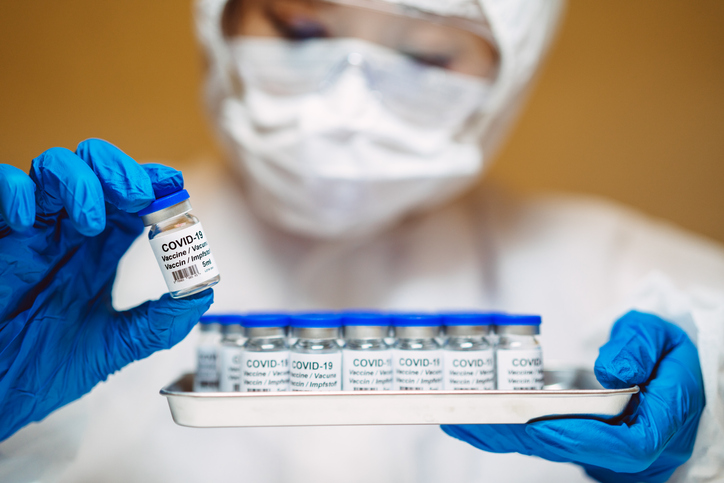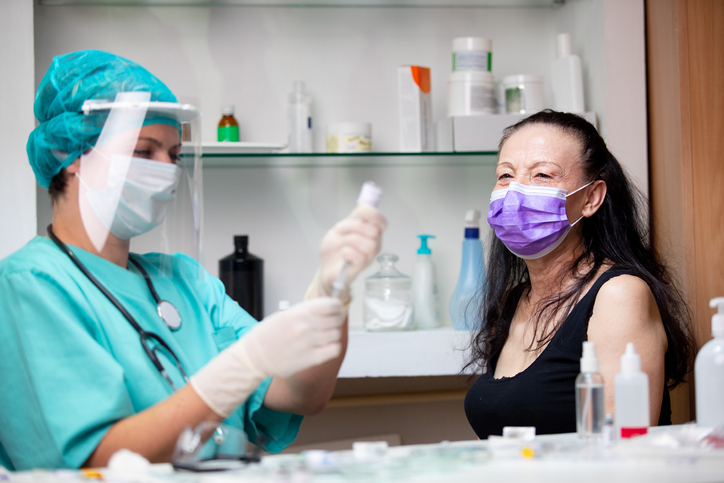Confused About COVID-19 Vaccines? This May Help.

By Joy Stephenson-Laws, J.D., Founder
If you’re confused about the different COVID-19 vaccines currently available (there are three as of now), as well as those in the pipeline, you are not alone. With the flood of information about the vaccines – some accurate and some not – it is only natural to wonder if they are safe, if they work, if one is better than another or whether you should wait for “the best.” You also may not be sure about how they work or what the difference is between “efficacy” and “effectiveness” when it comes to protecting you and your loved ones from SARS-CoV-2, the virus that causes COVID-19 disease. And if you’re like me, you probably want to know what you can do to stay healthy before you get vaccinated and whether there is anything you can do to maximize the vaccine’s protection.
Let's start with how vaccines work.
When a pathogen – such as a virus or a bacterium – invades our bodies, it draws the attention of our immune systems, which then mount a defense against the pathogen in an attempt to neutralize it before it can seriously threaten our health. When our immune systems are faced with a new pathogen, for example as is the case with SARS-CoV-2, they create all the germ-fighting tools they need to combat it.
Then the immune system “remembers” this new pathogen. This means it will have the toolkit ready to fight it off the next time it invades our bodies. This is why, for example, that children tend to have more frequent colds than adults – their immature immune systems are still “learning about and getting to know” all the different cold viruses that are out there. By the time we are adults, our immune systems have become quite adept at fighting off a wide variety of pathogens.

Now imagine if our bodies could “learn” about a pathogen and be ready to mount a defense against it without having to actually be infected and sickened by it? That is basically the idea behind vaccines and how they work. By introducing a harmless version of the pathogen, or even a little part of it, our immune systems mount a defense against it and then are ready to fight it off should we ever encounter the real thing.
This is a good time to mention, by the way, that a vaccine will not give us the disease itself.
This is exactly what the current vaccines against COVID-19, as well as those still under development, do. What is somewhat different with the vaccines for COVID-19 versus previous ones is that some of them are using a newer technology (the mRNA vaccines you have probably heard about) to achieve their goal of making sure our immune systems are ready to protect us should they encounter SARS-CoV-2. This, unfortunately, has sparked a variety of rumors and conspiracy theories that are not based in scientific fact. I can tell you with all certainty that there are no “mind control microchips” in these newer vaccines nor will they alter your DNA and cause you to grow extra toes. Some require two doses spaced two or three weeks apart while another currently available requires only one. It may also help to know that the COVID-19 vaccines currently being developed in the U.S. do not use the live virus that causes COVID-19 disease.
You may also not be sure about the difference between “efficacy” and “effectiveness,” both of which are being used a lot. The top-line difference is that “efficacy” answers the question “does it work” and “effectiveness” answers the question “how well does it work in the real world.”
As you can imagine, it’s one thing for a group of people to be taking a vaccine under a carefully controlled clinical trial and quite another when the general public takes it in large numbers. For example, there are several things that can impact a vaccine’s effectiveness outside of a trial. These include how people are vaccinated and the age and gender of the person receiving the vaccine as well as any medical conditions they may have.
It is also important to know that what researchers consider to be “effective” when it comes to a vaccine is very different from what you and I may consider “effective.” For scientific researchers, it usually means “prevents all disease symptoms” while for most of us, we would be happy with a level of effectiveness that “keeps me out of the hospital” or “keeps me from dying.” For COVID-19, this means that if a vaccine should reduce COVID-19 to being no worse than the common cold, researchers may say the vaccine was not effective since it didn’t prevent symptoms. I can’t speak for you, but I would be quite happy if I knew that a vaccine meant I didn’t have to worry about anything more than a few sniffles should I catch COVID-19.
This brings me to a question I hear frequently, which is “well, if the newer vaccines coming online are 66 effective and they are the only ones that happen to be available when it’s my turn to be vaccinated, should I delay getting vaccinated and wait for the better one that offers me 95 percent effectiveness?” The logic here, which is totally understandable, is “if 66 percent is good, then 95 percent is even better.” In the case of COVID-19, the answer is “not really.” I say this since in the clinical trials of the five vaccines currently available or in the approval process, not a single person died from COVID-19 and with the few vaccinated participants that did get sick enough to require hospitalization, none spent more than 28 days as an inpatient. So, if they all can keep you from dying, or limit any needed hospital stay, I would say there is no real difference among them. They all work, none is “better” than the other. In fact, leading medical experts are advising to “get the first one that becomes available to you.”
How To Be ProactiveWhile the vaccines for COVID-19 are indeed scientific marvels in terms of not only how quickly they were developed but also of how effective they are at preventing severe COVID-19 disease, we unfortunately can undermine their ability to protect us by making poor health and lifestyle choices. For example, in the way taking medicine for cholesterol does not mean you can eat all the fried and fatty foods you want, taking a vaccine does not mean you can or should do things that may reduce their effectiveness.
One concern with the COVID-19 vaccines, for example, is that they may not work as well in people who are obese since obesity can weaken the immune system. Another important factor influencing a vaccine’s effectiveness is our nutritional status. Research continues to show that not having nutritional imbalances or deficiencies can help bolster how the immune system responds to a vaccine.
Here’s what you can be doing now to make sure you can get the most benefit from the COVID-19 vaccine (whichever one you get) when it is your turn:
- Take steps to protect and strengthen your immune system – follow this link for tips
- Work to reduce chronic inflammation by managing your weight and reducing stress
- Identify and address any nutritional imbalances or deficiencies starting with a nutrient test
- Talk with your doctor about any OTC painkillers you may be taking since they might interfere with the vaccine
And, in the meantime, you should continue with the following to protect yourself from being infected with SARS-CoV-2 and to reduce your risk for a severe case of COVID-19 should you become infected:
- The first, of course, is to follow the “Three W” guidelines that everyone is familiar with by now: Wash your hands, Watch you distance, Wear a mask.
- The second is to address those conditions that have been shown to increase your risk of Covid-19 complications. These include quitting smoking if you still smoke and avoiding second-hand smoke; effectively managing your diabetes if you have it; and taking good care of your cardiovascular system.
Enjoy your healthy life!
Disclaimer: This article is not intended to provide medical advice. Please consult with your doctor or another competent healthcare practitioner to get specific medical advice for your situation.
The pH professional health care team includes recognized experts from a variety of health care and related disciplines, including physicians, attorneys, nutritionists, nurses and certified fitness instructors. This team also includes the members of the pH Medical Advisory Board, which constantly monitors all pH programs, products and services. To learn more about the pH Medical Advisory Board, click here.







